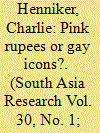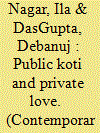| Srl | Item |
| 1 |
ID:
093726


|
|
|
|
|
| Publication |
2010.
|
| Summary/Abstract |
Discussions of contemporary films and publications now illustrate the problematic terminology of terms like 'gay' or 'camp' in India, coupled with increasing speculation and reference to homosexuality. This article analyses media representations of Hindi cinema stars and highlights the emergence of some male stars as icons for gay communities within India and in the diaspora. Analysis of the way Bollywood celebrities are represented in India's press in-dicates that the media has been crucial for this emergence to occur. Focussing on Shah Rukh Khan, Bollywood's most recognisable and influential star today, the article argues that while a cult of interpretation surrounds Bollywood icons, there is a definite trend of stars confronting and negotiating sexually ambiguous spaces, both on screen and off. Media 'gossip' and specific public responses thus serve a variety of commercial as well as socio-cultural and wider political purposes.
|
|
|
|
|
|
|
|
|
|
|
|
|
|
|
|
| 2 |
ID:
143547


|
|
|
|
|
| Summary/Abstract |
In this paper, we juxtapose the present-day Supreme Court battles over the colonial anti-sodomy provisions in the Indian Penal Code (Section 377), with everyday interpretations of carnal intercourse by kotis and jananas in order to visibilize a whole different social world of carnality. The responses to the law coming from the civil society formations (namely the lesbian, gay, bisexual and transgender (LGBT) rights organizations, HIV/AIDS organizations and women's rights organizations) are the site for the formation of a modern Indian homosexual subject, one who claims her/his rights to love and privacy through the language of human rights and constitutional freedom. We argue that the arrival of the modern rights-bearing homosexual subject is contested by political and religious formations through discourses of sin, unnaturality and proper sexual conduct. The contestation of religious discourse through the discourse of constitutional rights covers over the creative interpretations of religion provided by kotis/jananas. An analysis of the kotis/janana discourse and bodily practices reveals sexual subject formation through the creative reinterpretation of notions such as sin and unnaturality. In conclusion, we contend that the creative interpretations of religious themes by kotis/jananas trouble nationalist religious discourses as well as the constitutional discourses of the LGBT rights movement.
|
|
|
|
|
|
|
|
|
|
|
|
|
|
|
|